
Turtle Islands: Sierra Leone's Hidden Paradise
The Turtle Islands, located off the coast of Sierra Leone, are a group of eight idyllic islands known for their untouched beauty and serene environment. These islands are perfect for travelers seeking a secluded getaway, far from the hustle and bustle of city life. The crystal-clear waters, white sandy beaches, and lush greenery offer a picturesque landscape that is both relaxing and rejuvenating. Visitors to the Turtle Islands can enjoy a range of activities, from snorkeling and fishing to exploring the local culture. The waters surrounding the islands are teeming with marine life, making it a haven for snorkeling enthusiasts. Fishing is also a popular activity, with local fishermen often willing to share their traditional techniques with visitors. For those interested in cultural experiences, the islands are home to small fishing communities that welcome visitors with warm hospitality. One of the most unique aspects of the Turtle Islands is their commitment to eco-tourism. The local communities work hard to preserve their natural environment and promote sustainable tourism practices. This dedication ensures that the islands remain a pristine paradise for future generations to enjoy. Whether you're looking for adventure or relaxation, the Turtle Islands offer an unforgettable experience that captures the essence of Sierra Leone's natural beauty.
Local tips in Turtle Islands
- Bring cash as there are no ATMs or card facilities on the islands.
- Pack eco-friendly sunscreen to protect the marine life.
- Respect local customs and traditions when visiting the fishing communities.
- Arrange transportation in advance, as getting to the islands can be tricky.
- Carry basic medical supplies, as healthcare facilities are limited.
Turtle Islands: Sierra Leone's Hidden Paradise
The Turtle Islands, located off the coast of Sierra Leone, are a group of eight idyllic islands known for their untouched beauty and serene environment. These islands are perfect for travelers seeking a secluded getaway, far from the hustle and bustle of city life. The crystal-clear waters, white sandy beaches, and lush greenery offer a picturesque landscape that is both relaxing and rejuvenating. Visitors to the Turtle Islands can enjoy a range of activities, from snorkeling and fishing to exploring the local culture. The waters surrounding the islands are teeming with marine life, making it a haven for snorkeling enthusiasts. Fishing is also a popular activity, with local fishermen often willing to share their traditional techniques with visitors. For those interested in cultural experiences, the islands are home to small fishing communities that welcome visitors with warm hospitality. One of the most unique aspects of the Turtle Islands is their commitment to eco-tourism. The local communities work hard to preserve their natural environment and promote sustainable tourism practices. This dedication ensures that the islands remain a pristine paradise for future generations to enjoy. Whether you're looking for adventure or relaxation, the Turtle Islands offer an unforgettable experience that captures the essence of Sierra Leone's natural beauty.
When is the best time to go to Turtle Islands?
Iconic landmarks you can’t miss
River No 2 Beach
Experience the serene beauty and vibrant culture of River No 2 Beach in Sierra Leone, a perfect tropical getaway for relaxation and adventure.
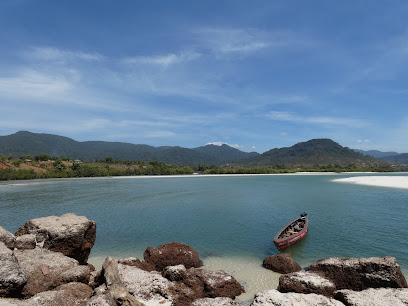
Cotton Tree
Discover Cotton Tree, a historic landmark in Freetown, Sierra Leone, symbolizing the resilience and rich culture of the Sierra Leonean people.
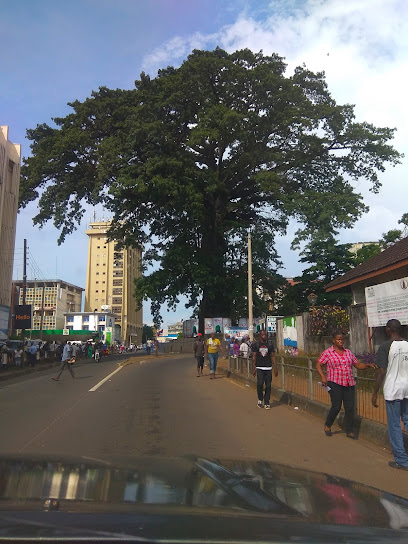
Visit Sierra Leone (VSL Travel)
Explore Sierra Leone's stunning landscapes, vibrant culture, and historical treasures with VSL Travel, your ultimate tour operator for unforgettable adventures.
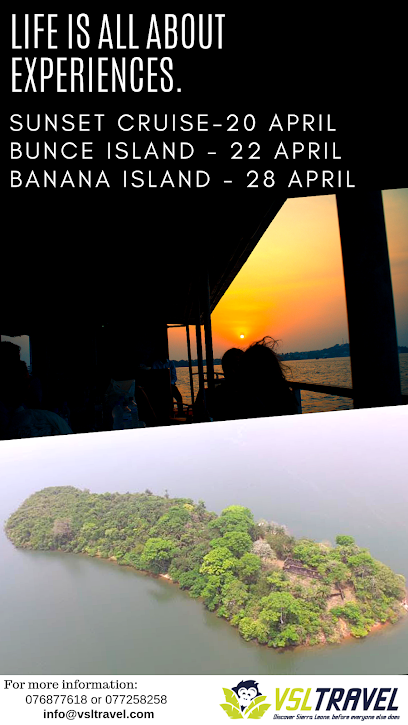
Lakka Beach
Discover the enchanting beauty of Lakka Beach, a serene destination in Sierra Leone, where golden sands meet crystal-clear waters for an unforgettable experience.
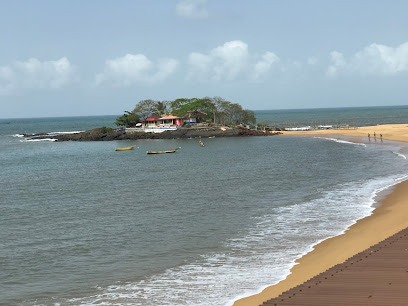
Bureh Beach
Discover the beauty of Bureh Beach, a pristine coastal haven in Sierra Leone offering sun, surf, and stunning sunsets in a vibrant atmosphere.
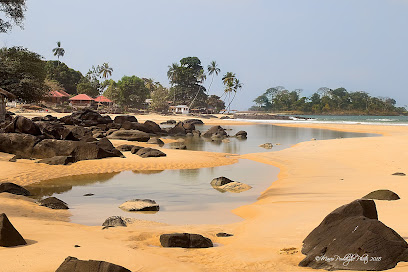
Banana Islands
Explore the serene Banana Islands, a hidden gem in Sierra Leone, offering pristine beaches, rich culture, and stunning natural beauty.
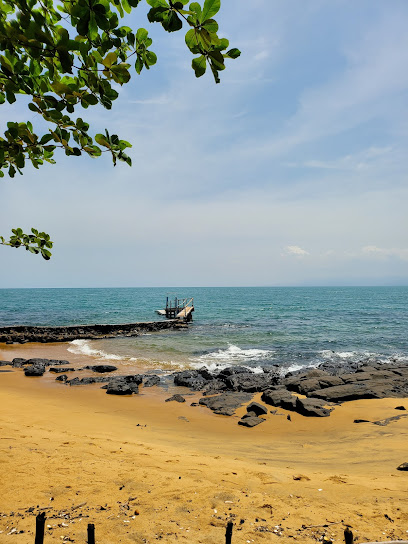
Freetown Central Mosque
Discover the Freetown Central Mosque, a stunning landmark blending spiritual significance and architectural beauty in Sierra Leone.
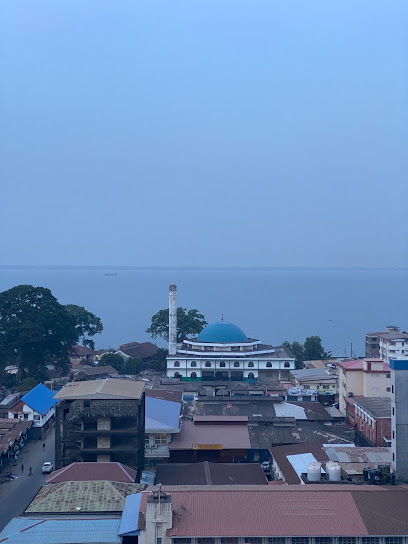
Banana Island
Experience the tranquil beauty and vibrant culture of Banana Island, a hidden paradise off Sierra Leone's coast, perfect for relaxation and adventure.
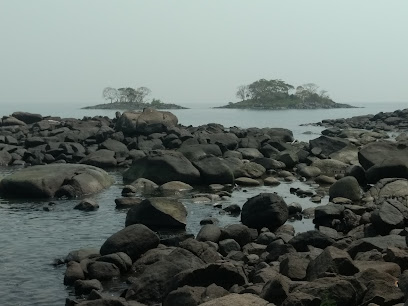
St. John's Maroon Church
Experience the historical and spiritual significance of St. John's Maroon Church, a vibrant testament to Sierra Leone's rich cultural heritage.
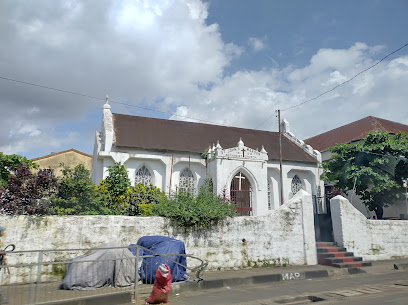
Outamba Kilimi National Park
Discover the stunning landscapes and rich biodiversity of Outamba Kilimi National Park, a must-visit destination for nature lovers in Sierra Leone.
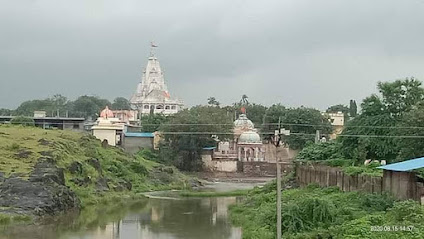
Sherbro Island
Experience the serene beauty and rich culture of Sherbro Island, a tropical paradise in Sierra Leone perfect for relaxation and adventure.
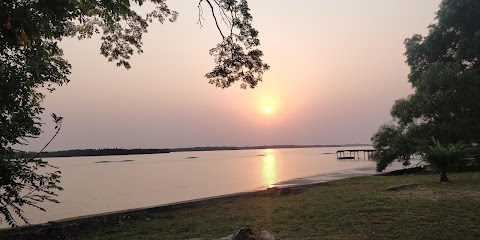
Old Turtle Bay Beach Resort
Experience the serene beauty of Old Turtle Bay Beach Resort, a perfect blend of relaxation and adventure on the Banana Islands.
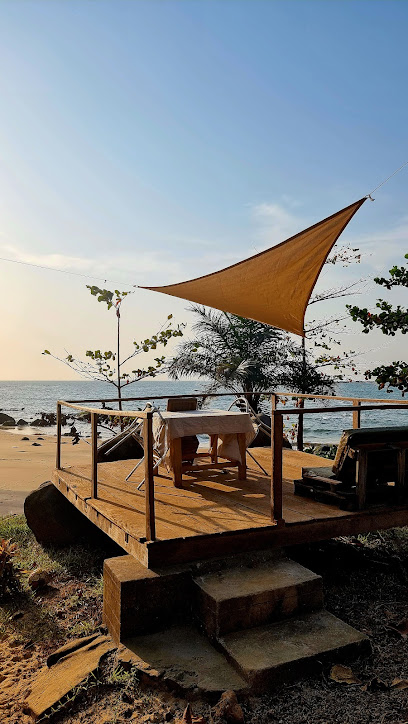
Town Tower
Discover the breathtaking views and rich history at Bonthe's iconic Town Tower, a must-visit landmark for every traveler exploring Sierra Leone.
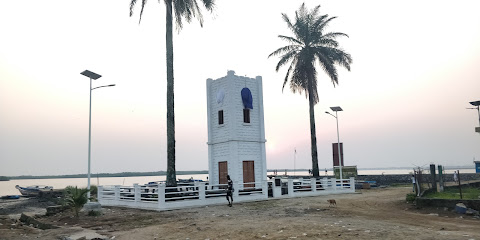
Ricketts, Sierra Leone
Explore the untouched beauty of Ricketts Island in Sierra Leone, a perfect destination for relaxation, adventure, and connecting with nature.
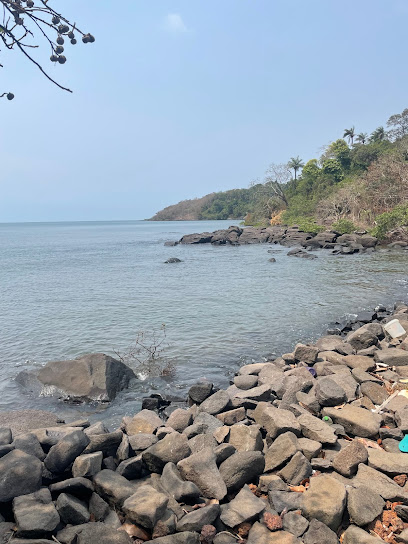
Monuments and Relics Commission
Discover Sierra Leone's cultural heritage at the Monuments and Relics Commission, a vital institution in Freetown dedicated to preserving history.
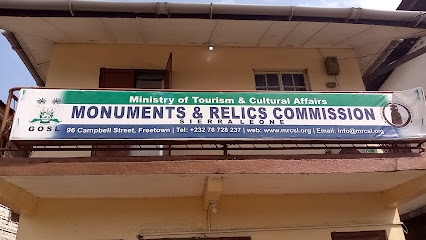
Unmissable attractions to see
Sherbro Island
Explore the pristine beaches, rich culture, and stunning landscapes of Sherbro Island, a hidden gem in Sierra Leone that promises unforgettable adventures.
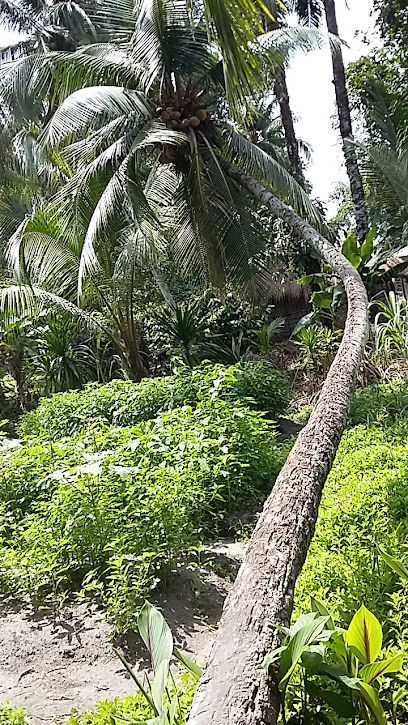
Tiwai Island Wildlife Sanctuary
Experience the natural beauty and rich biodiversity of Tiwai Island Wildlife Sanctuary in Sierra Leone, a perfect destination for adventure and family fun.
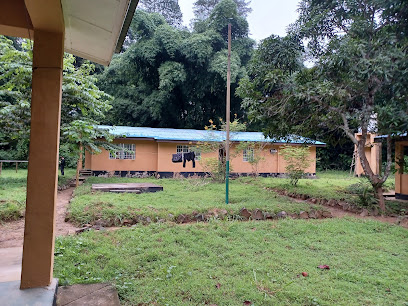
Nyangei
Explore the untouched beauty of Nyangei Island, a serene escape in Sierra Leone boasting stunning beaches and vibrant wildlife experiences.

Gefechtsstützpunkt und Kanonen bei Old Wharf
Explore the historical significance and breathtaking views of Gefechtsstützpunkt und Kanonen on the beautiful Banana Islands in Sierra Leone.

Moot
Explore the hidden beauty of Moot Island, a serene escape in Sierra Leone with pristine beaches, lush landscapes, and unique cultural experiences.

Essential places to dine
Mamba Point Hotel Restaurant Lagoonda
Discover exquisite dining with breathtaking ocean views at Mamba Point Hotel Restaurant Lagoonda in Freetown, Sierra Leone.

Gigibontà Ice Cream and Pizzeria
Discover delightful Italian ice cream and authentic pizzas at Gigibontà near Lumley Beach in Freetown - a must-visit for every traveler.
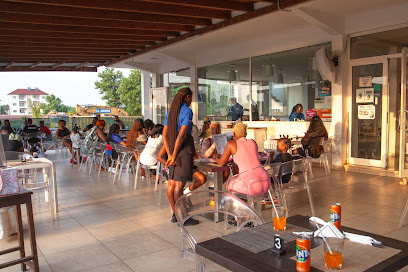
Crown Bakery
Discover authentic Sierra Leonean flavors at Crown Bakery, where fresh ingredients meet traditional recipes in a warm, inviting atmosphere.
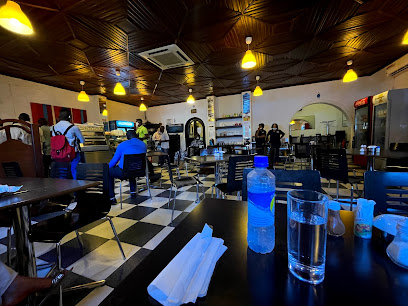
Crown Xpress
Discover the culinary delights at Crown Xpress in Freetown, where local flavors meet international cuisine in a welcoming atmosphere.
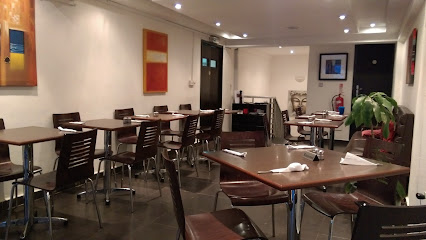
Bliss Restaurant
Discover culinary delights at Bliss Restaurant in Freetown – where local flavors meet international cuisine in an inviting atmosphere.
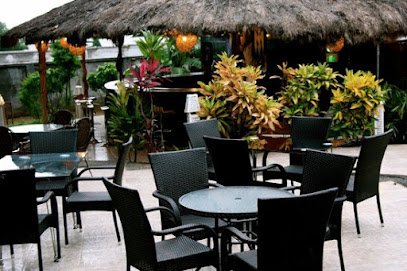
Olba Restaurant
Experience authentic Mediterranean flavors at Olba Restaurant in Freetown - where culinary excellence meets breathtaking ocean views.
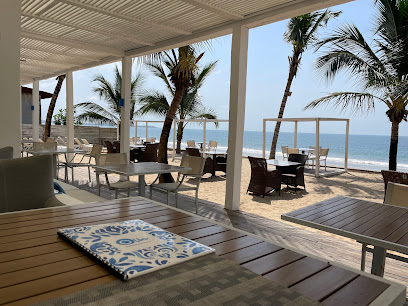
LOR Resturant
Experience the best of local and international cuisine at LOR Restaurant in Freetown - a must-visit destination for food enthusiasts.
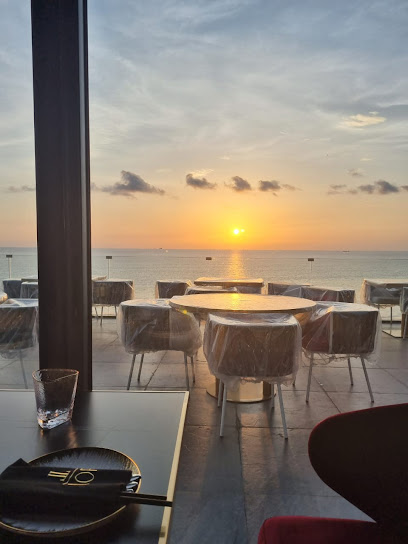
Swan restaurant & Grill
Discover exquisite flavors at Swan Restaurant & Grill in Aberdeen - where local cuisine meets international flair amidst Freetown's vibrant atmosphere.
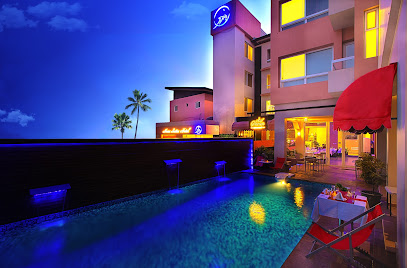
Ruri's Restaurant
Discover Ruri's Restaurant in Bo - where local flavors meet international cuisine in a warm and welcoming atmosphere.
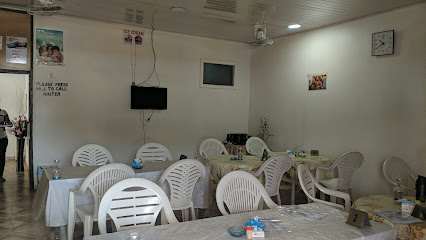
Bafa Resort
Discover Bafa Resort: A beautiful retreat on Banana Island offering stunning views, fresh seafood dining, and thrilling fishing adventures.
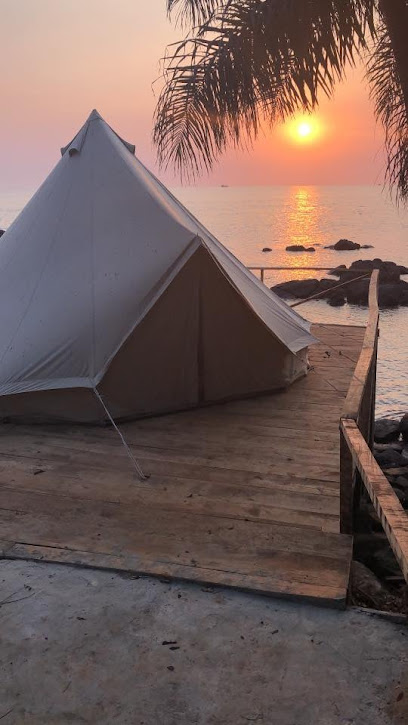
Leo Restaurant & Cafe
Experience fine dining with breathtaking ocean views at Leo Restaurant & Cafe in Freetown, Sierra Leone.
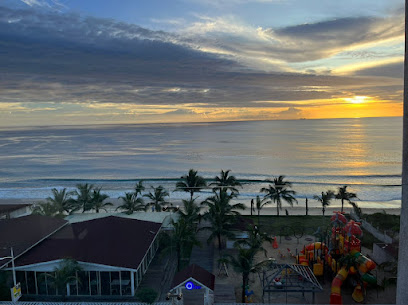
D's Bazaar
Discover authentic Sierra Leonean cuisine at D's Bazaar in Freetown - where vibrant flavors meet local culture.
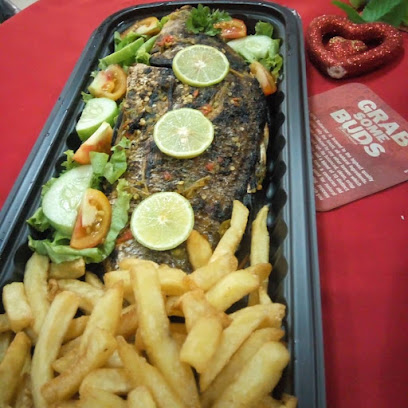
Old Turtle Bay Beach Resort
Experience paradise at Old Turtle Bay Beach Resort - where relaxation meets adventure on Banana Islands.
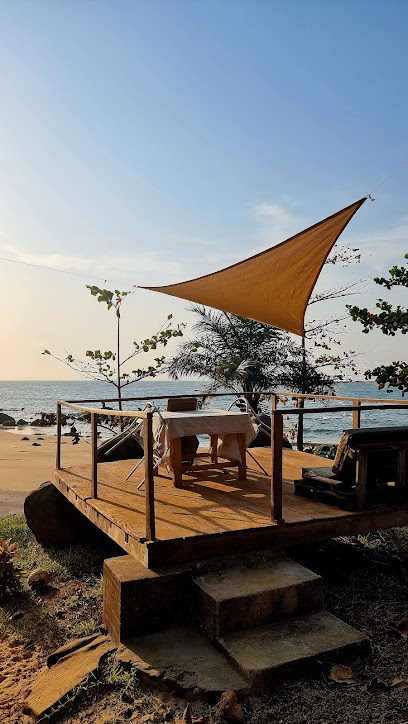
Fataya On The Go
Discover authentic fast food flavors at Fataya On The Go in Freetown - where every bite takes you on a culinary adventure.
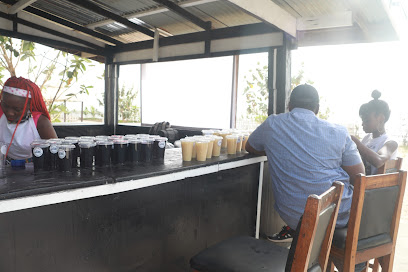
Menyeleh's Beach Bar and Restaurant
Discover tropical flavors at Menyeleh's Beach Bar and Restaurant on Bureh Beach - where culinary delight meets stunning ocean views.
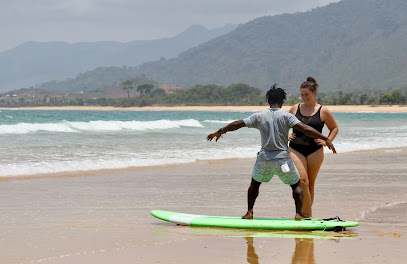
Markets, malls and hidden boutiques
Freetown Mall
Discover local flavors and everyday essentials at Freetown Mall, a vibrant supermarket experience in the heart of Sierra Leone.
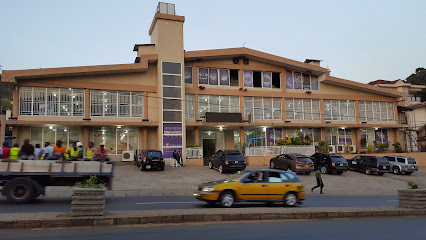
SaloneBuy
Explore SaloneBuy, Freetown's innovative e-commerce destination for unique products, advertising solutions, and dynamic business opportunities.
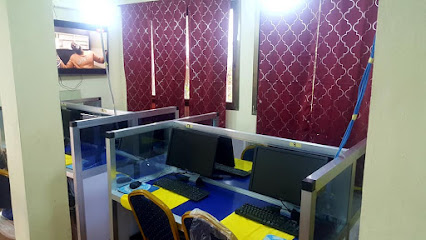
vip Fashion store
Explore Freetown's VIP Fashion Store for unique styles and local craftsmanship, where fashion meets culture in an exquisite boutique experience.
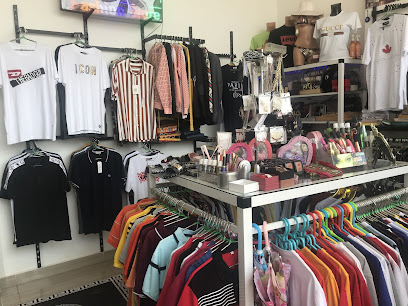
Bonthe Fresh Market
Explore the Bonthe Fresh Market – a vibrant showcase of Sierra Leone's local produce, culture, and community spirit.
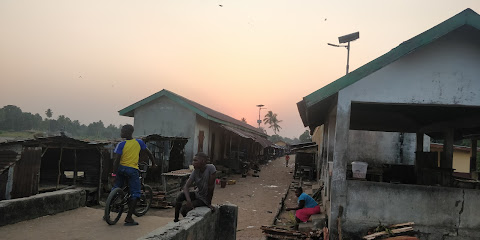
Hawawa Boutique Freetown SL
Discover unique fashion and local craftsmanship at Hawawa Boutique, a must-visit destination in Freetown, Sierra Leone, for unforgettable souvenirs.

Banana Divers Sierra Leone
Dive into adventure at Banana Divers in Sierra Leone, where stunning marine life and unforgettable experiences await every diver.
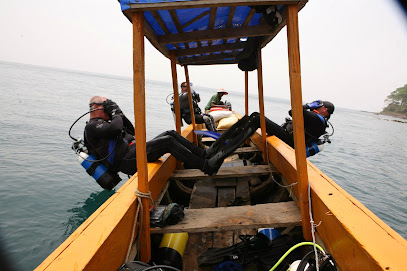
Rickma Fishing Company Limited
Discover the ideal fishing gear and local expertise at Rickma Fishing Company Limited, your gateway to unforgettable fishing adventures on Mama Beach.
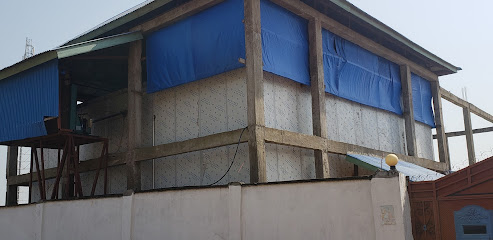
MINITITI LUMLEY
Explore the vibrant world of fashion accessories at MINITITI LUMLEY, Freetown's hidden gem for unique and stylish finds.

Wesley Enterprises Restaurant
Experience the delightful flavors of local baking at Wesley Enterprises Restaurant, a cozy bakery in Mo-Konkodu with fresh pastries and a warm atmosphere.

Misspreneur SL Ltd
Explore Misspreneur SL Ltd in Freetown for the best in home improvement, furniture, and interior design, showcasing local craftsmanship and unique styles.
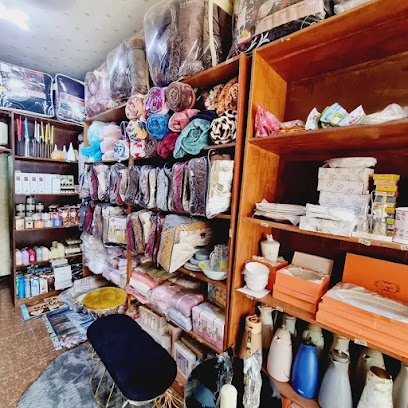
The Family Enterprise
Discover The Family Enterprise in Yo - your local pharmacy for health essentials and community connection.

Kinsmen Enterprise
Discover Kinsmen Enterprise in Bonthe, your reliable local pharmacy for health essentials and personalized service.

Manowa Drugstore
Discover essential health and wellness products at Manowa Drugstore in Bonthe, a reliable pharmacy for travelers and locals alike.

Abass And Sons Drgu Store
Discover Abass And Sons Drug Store in Bompetok for all your pharmaceutical needs—where health meets community care.

Bonthe District Fisheries
Explore Bonthe District Fisheries, where local fishing culture meets sustainable practices in a vibrant community setting.

Essential bars & hidden hideouts
Mamba Point Hotel Restaurant Lagoonda
Experience the rich flavors of Sierra Leone at Mamba Point Hotel Restaurant Lagoonda, where exquisite dining meets stunning ocean views.

Gigibontà Ice Cream and Pizzeria
Experience the best of Italian cuisine and artisanal ice cream at Gigibontà, a vibrant eatery by Lumley Beach in Freetown, Sierra Leone.
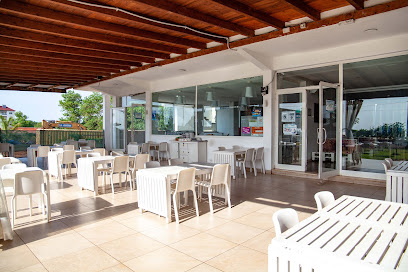
Roy Hotel & Restaurant
Discover the vibrant flavors of Freetown at Roy Hotel & Restaurant, where delicious cuisine meets stunning beach views for an unforgettable dining experience.
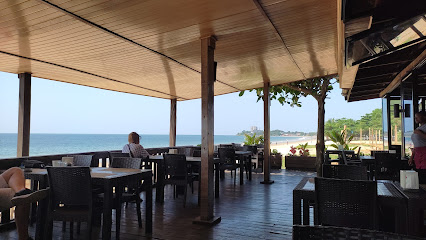
Olba Restaurant
Experience the essence of Mediterranean dining at Olba Restaurant in Freetown, where every meal is a delicious escape.
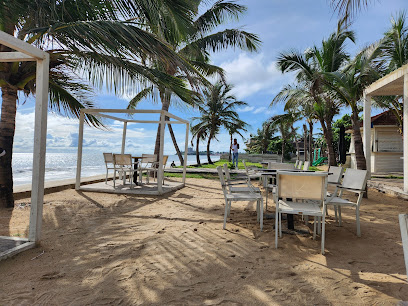
Roof Garden Bar & Restaurant
Discover the perfect blend of breathtaking views and exquisite dining at Roof Garden Bar & Restaurant in Freetown.
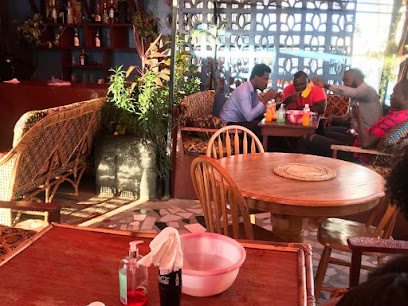
LOR Resturant
Experience the vibrant taste of Sierra Leone at LOR Restaurant, where local flavors meet international cuisine in a warm and inviting atmosphere.
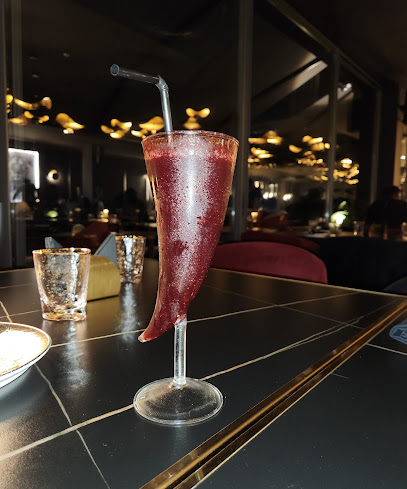
Leone sky bar
Experience breathtaking views and vibrant nightlife at Leone Sky Bar, the ultimate rooftop destination in Freetown, Sierra Leone.
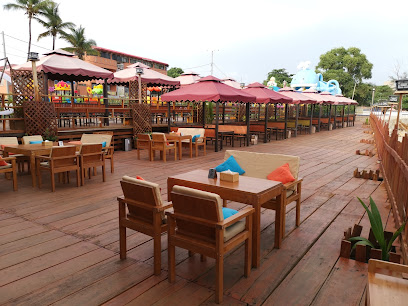
KOLOLI Bar & Restaurant
Discover the vibrant culinary scene at KOLOLI Bar & Restaurant, where Sierra Leonean flavors meet a lively atmosphere in Freetown.
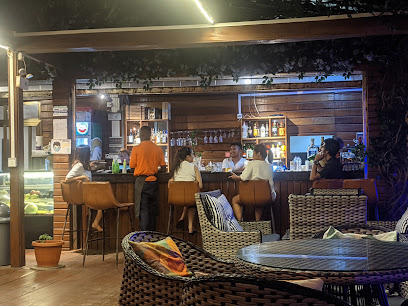
Remedy Hangout Bar
Discover the lively nightlife of Freetown at Remedy Hangout Bar, where vibrant music, delicious drinks, and unforgettable memories await.

Mamz Beach Bar
Experience the vibrant atmosphere and stunning views at Mamz Beach Bar, the perfect coastal retreat in Freetown, Sierra Leone.
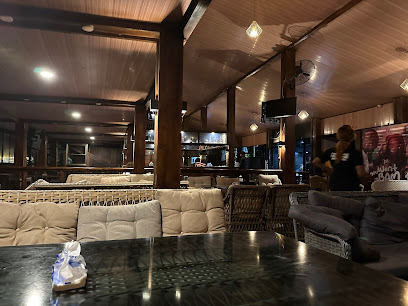
Leo Restaurant & Cafe
Discover exquisite dining at Leo Restaurant & Cafe, where local flavors meet international cuisine along the stunning Lumley Beach in Freetown.
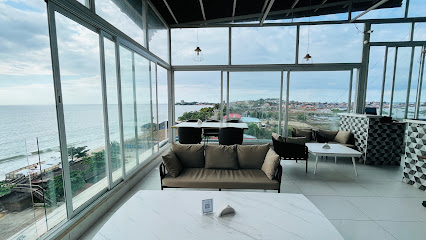
DeVillage Beach Bar & Restaurant
Discover the vibrant flavors and breathtaking views at DeVillage Beach Bar & Restaurant, a beachfront gem in Freetown, Sierra Leone.
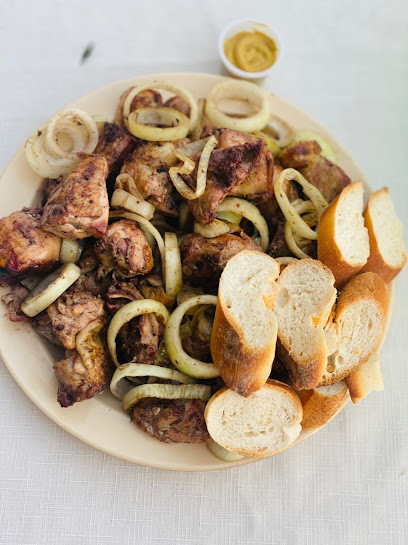
Menyeleh's Beach Bar and Restaurant
Experience the perfect blend of local flavors and breathtaking ocean views at Menyeleh's Beach Bar and Restaurant on Bureh Beach.
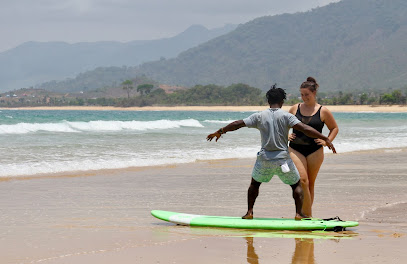
Vanity
Experience the vibrant atmosphere of Vanity Lounge in Freetown, where relaxation meets entertainment in a stylish setting.

Local Phrases about Turtle Islands
-
- HelloSannu
[sa-nu] - GoodbyeDeh wahala
[deh wa-ha-la] - YesEh
[eh] - NoAa
[aa] - Please/You're welcomeAbeg
[a-beg] - Thank youTenki
[ten-ki] - Excuse me/SorrySori
[so-ri] - How are you?How di bodi?
[how di bo-di] - Fine. And you?I dey kam
[i dey kam] - Do you speak English?Yu sabi tok English?
[yu sa-bi tok in-glish] - I don't understandAh nor sabi
[ah nor sa-bi]
- HelloSannu
-
- I'd like to see the menu, pleaseAh go lek see di menu, abeg
[ah go lek see di me-nu, a-beg] - I don't eat meatAh nor dey eat meat
[ah nor dey eat meat] - Cheers!Cheers!
[cheers] - I would like to pay, pleaseAh go lek pay, abeg
[ah go lek pay, a-beg]
- I'd like to see the menu, pleaseAh go lek see di menu, abeg
-
- Help!Ehlp!
[ehlp] - Go away!Nor kam ya!
[nor kam ya] - Call the Police!Kol polis!
[kol po-lis] - Call a doctor!Kol doktor!
[kol dok-tor] - I'm lostAh loss
[ah loss] - I'm illAh sick
[ah sick]
- Help!Ehlp!
-
- I'd like to buy...Ah go lek buy...
[ah go lek buy] - I'm just lookingAh jus di luk
[ah jus di luk] - How much is it?How moch e cost?
[how moch e cost] - That's too expensiveE too cost
[e too cost] - Can you lower the price?Yu fit redi di cost?
[yu fit re-di di cost]
- I'd like to buy...Ah go lek buy...
-
- What time is it?Na wich time?
[na wich time] - It's one o'clockNa one o'clock
[na one o'clock] - Half past (10)Half past (10)
[half past (10)] - MorningMorning
[morning] - AfternoonAfternoon
[afternoon] - EveningEvening
[evening] - YesterdayYestade
[yes-ta-de] - TodayToday
[today] - TomorrowTomoro
[to-mo-ro] - 11
[1] - 22
[2] - 33
[3] - 44
[4] - 55
[5] - 66
[6] - 77
[7] - 88
[8] - 99
[9] - 1010
[10]
- What time is it?Na wich time?
-
- Where's a/the...?Wey...dey?
[wey...dey] - What's the address?Wetin be di address?
[we-tin be di ad-dress] - Can you show me (on the map)?Yu fit show mi (pan di map)?
[yu fit show mi (pan di map)] - When's the next (bus)?Wen di nex wan dey kam?
[wen di nex wan dey kam] - A ticket (to ....)A ticket (to ....)
[a ticket (to ....)]
- Where's a/the...?Wey...dey?
History of Turtle Islands
-
Long before European explorers set foot on the Turtle Islands, the area was inhabited by indigenous tribes, primarily the Sherbro people. These tribes relied on the rich marine resources and fertile lands for sustenance, practicing fishing, farming, and trading with neighboring communities.
-
In the 15th century, Portuguese navigators were among the first Europeans to explore the West African coastline, including the Turtle Islands. The Portuguese influence can still be seen in some of the region’s architecture and cultural practices. They named the area 'Ilhas das Tartarugas', meaning Turtle Islands, due to the abundance of sea turtles.
-
During the 17th and 18th centuries, the Turtle Islands played a significant role in the transatlantic slave trade. European traders established temporary forts and trading posts on the islands, where enslaved Africans were held before being shipped to the Americas. The islands' strategic location made them a crucial point in this dark chapter of history.
-
In the 19th century, Sierra Leone, including the Turtle Islands, came under British colonial rule. The British influence brought changes in governance, education, and infrastructure. The islands served as a base for British anti-slavery patrols, which sought to intercept illegal slave ships.
-
The Turtle Islands are steeped in local legends and folklore, many of which have been passed down through generations. Stories of mythical sea creatures, ancient spirits, and legendary heroes are an integral part of the islands' cultural heritage, offering a glimpse into the rich oral traditions of the Sherbro people.
-
Today, the Turtle Islands are a serene and relatively untouched destination, known for their pristine beaches, vibrant marine life, and traditional Sherbro villages. The islands are a testament to the resilience of their inhabitants, who have preserved their unique culture and way of life despite the many historical changes.
Turtle Islands Essentials
-
The Turtle Islands are located off the coast of Sierra Leone. The closest major city is Freetown, the capital of Sierra Leone. From Freetown, you can take a boat or ferry to the Turtle Islands. Regular boat services are available from the Government Wharf in Freetown, and the journey typically takes around 4 to 6 hours, depending on the weather and sea conditions. Private boat charters are also available for a more personalized experience.
-
Once on the Turtle Islands, transportation options are limited. The islands are small and can be easily navigated on foot. For inter-island travel, local fishermen often provide boat services. It is advisable to arrange transportation in advance through your accommodation or a local guide. There are no cars or public transport systems on the islands, so walking and boating are the primary modes of transportation.
-
The official currency in Sierra Leone is the Leone (SLL). The Turtle Islands have very limited banking facilities, and credit cards are generally not accepted. It is essential to carry sufficient cash for your entire stay. Currency exchange can be done in Freetown before you depart for the islands. Make sure to carry small denominations, as it can be challenging to get change for large bills.
-
The Turtle Islands are generally safe for tourists, with low crime rates. However, it is always prudent to take standard safety precautions. Avoid walking alone at night and keep your belongings secure. Be cautious when swimming, as there are no lifeguards, and currents can be strong. It is also advisable to have travel insurance that includes medical evacuation, as healthcare facilities on the islands are limited.
-
In case of an emergency, contact your accommodation provider or a local guide immediately. There are limited medical facilities on the Turtle Islands, so it is crucial to have travel insurance that covers medical emergencies and evacuation. For serious medical issues, you may need to be transported back to Freetown. Emergency services can be reached by dialing 999, but response times may vary due to the remote location.
-
Fashion: Do dress modestly, especially in villages. Lightweight, breathable clothing is advisable due to the tropical climate. Avoid wearing overly revealing attire. Religion: Do respect local customs and traditions. The majority of the inhabitants are Muslim, so be considerate in your behavior and dress. Public Transport: Do be patient and respectful when using local boats. Punctuality is often flexible. Greetings: Do greet locals with a smile and a handshake. It is polite to ask about someone's well-being. Eating & Drinking: Do try local dishes and seafood. Always wash your hands before eating. Don't waste food, as resources can be limited.
-
To experience the Turtle Islands like a local, engage with the community and participate in daily activities such as fishing and cooking. Visit the local markets to buy fresh seafood and handmade crafts. Take time to learn about the traditional ways of life and the history of the islands from the elders. Respect the environment by not littering and supporting eco-friendly practices.
Trending Landmarks in Turtle Islands
-
River No 2 Beach
-
Cotton Tree
-
Visit Sierra Leone (VSL Travel)
-
Lakka Beach
-
Bureh Beach
-
Banana Islands
-
Freetown Central Mosque
-
Banana Island
-
St. John's Maroon Church
-
Outamba Kilimi National Park
-
Sherbro Island
-
Old Turtle Bay Beach Resort
-
Town Tower
-
Ricketts, Sierra Leone
-
Monuments and Relics Commission
Nearby Cities to Turtle Islands
-
Things To Do in Port Loko
-
Things To Do in Pujehun
-
Things To Do in Magburaka
-
Things To Do in Kenema
-
Things To Do in Conakry
-
Things To Do in Monrovia
-
Things To Do in Kakata
-
Things To Do in Faranah
-
Things To Do in Voinjama
-
Things To Do in Buchanan
-
Things To Do in Gbarnga
-
Things To Do in Ganta
-
Things To Do in Quebo
-
Things To Do in Sanniquellie
-
Things To Do in Buba







